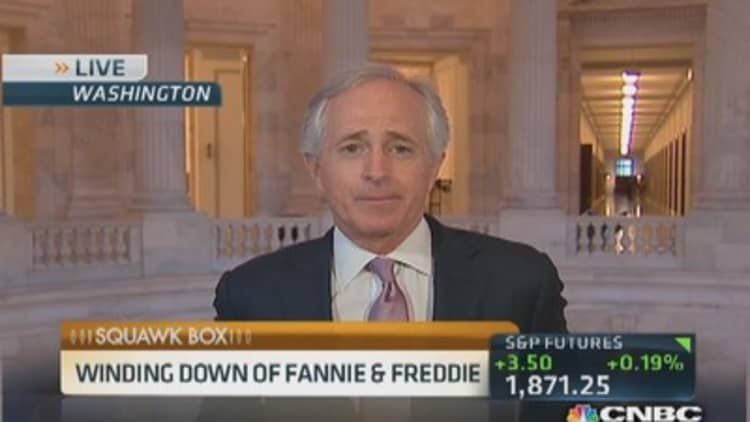The leadership of the Senate Banking Committee with some fanfare this week released its long-awaited proposal to reform the U.S. housing finance system by dramatically scaling back the government's role and eliminating Fannie Mae and Freddie Mac.
The proposal, from Banking Chairman Tim Johnson, D-S.D., and ranking member Mike Crapo, R-Idaho, does not have formal legislative language yet. And yet it may already be dead.
Whispers around Washington hold that more liberal members of the committee, including Sherrod Brown of Ohio (who may become chairman next year) and Elizabeth Warren of Massachusetts, are lining up in opposition to the bill because they do not believe it does enough to further the goals of expanding affordable housing.
"The GSE (government-sponsored enterprise) 'juggernaut' is mostly smoke & mirrors," one senior Democratic Washington source told me this week. "Brown and Warren are letting people know that it's a non-starter and [Senate Majority Leader] Reid is playing a little Kabuki because his Las Vegas housing market is in the tank and he doesn't want to upset any apple carts during the slow recovery there."
The chances that the full Congress would pass significant housing reform this midterm election year were always fairly slim. House Financial Services Committee Chairman Jeb Hensarling's "PATH Act" would completely eliminate the government role. That bill may never get to the House floor. But if the House were to take up a housing bill it would almost certainly be something Democrats would fully reject.
(Read more: After Fannie and Freddie—Who's next?)
The Senate Banking goals were thought to be more modest. Lay down a marker for any future housing reform efforts by at least getting a bill out of committee. That could give the party a talking point for the fall—We want to reform housing finance!—without the pain of actually passing anything.
Now even that goal seems like a bridge too far. But not everyone is giving up on the idea that a bill could eventually emerge from the committee. Brown and Warren alone could not stop a bill. They would need to gain critical mass for their opposition, something that's hard to do at the moment with no formal language on the table.
"If the chair and ranking member have 16 plus votes on the banking committee, Brown and Warren are mere bystanders," said a plugged-in D.C. Republican. "If they choose to stay off the deal, the only thing they will control is the timing of when they withdraw or get beaten on their amendments. [Reid], however, holds far, far more power over this bill. On pretty much a unilateral basis, he can stop it cold or rewrite it entirely."

This person added that the true plan for the bill remains possible.
"It's my suspicion the Administration, the Senate Leadership and possibly even the Committee leaders are unified behind simply passing the bill out of the Committee and setting a marker on the subject," he said. "I do not think there is, or ever was, interest in moving the bill through the full Senate."
(Read more: Yes, it's March, but DC's legislative year is over)
None of this means the hedge funds that eventually hope to reap huge profits on their Fannie and Freddie shares should rest easy. The sharp drop in the shares this week after the announcement of the Senate Banking proposal was, in fact unwarranted, given the grim future of the bill.
But to cash in, the funds will have to both win their court battle against the government's decision to sweep Fannie and Freddie profits into the U.S. Treasury and get an eventual bill that retains the existing housing finance giants in some form.
Part of the reason there is so little appetite for reforming the government role in housing right now is the big profits the GSEs are providing to Uncle Sam. The government is going to fight hard to keep that money flowing.
(Read more: Fannie stock dives after Senate bankers reach deal)
And should a housing finance reform measure ever move toward final passage by both houses of Congress next year, it's hard to imagine it will do so in a way that makes homeownership even slightly more difficult by reducing the federal role and simultaneously provides a huge payday to billionaire hedge fund managers. The politics of such a bill would be horrendous and almost guarantee failure.
The status quo—a "too big to fail" housing finance system that threatens the financial system—seems likely to prevail for the foreseeable future.
—By Ben White. White is POLITICO's chief economic correspondent and a CNBC contributor. He also authors the daily tip sheet POLITICO Morning Money [politico.com/morningmoney]. Follow him on Twitter @morningmoneyben.


